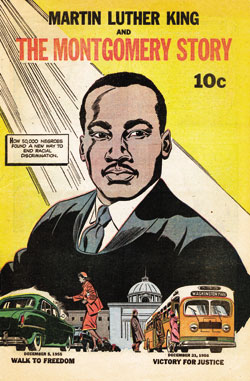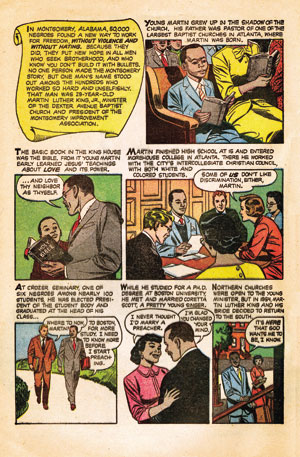THE COMIC THAT INSPIRED A MOVEMENT: Andrew Aydin on Martin Luther King and the Montgomery Story
Jan 20, 2014
In the late 1950s, as the Civil Rights Movement was gaining strength throughout the country, the peace organization The Fellowship of Reconciliation used one of the most accessible formats of the day to help promote their message of nonviolent resistance – the comic book.
This comic, Martin Luther King and the Montgomery Story (FEB141441), was handed out at churches and nonviolence workshops, and was the inspiration for many figures in the Civil Rights Movement, including Rep. John Lewis, whose own story is told in Top Shelf Productions’ graphic novel series March. March was co-written by Rep. Lewis’ and his aide Andrew Aydin, who was well-versed in The Montgomery Story, having written his college thesis on the comic book.
Top Shelf Productions is now bringing Martin Luther King and the Montgomery Story to a modern audience with a new printing of the comic book, which will be available in the February PREVIEWS.
In this interview, Aydin details the history of Martin Luther King and the Montgomery Story, and sheds light on how this book became significant in comics and American history.
PREVIEWSworld: When did you first read this comic, and what was it about the comic that made such an impact on you?
 Andrew Aydin: I read Martin Luther King and the Montgomery Story for the first time in the summer of 2008. I was captivated by the idea of this comic book being responsible for inspiring direct nonviolent action. You read comics most of your life and somewhere along the line you think, “Man, it’d be cool if I could fly,” or something like that. And here was a comic where you didn’t need superpowers to do what the characters were doing. It had many of the same principles of justice like those of a lot of mainstream super hero comics but you didn’t have be from Krypton or born into a billionaire family to fight in the same way as the characters in the comic. In fact, their way of fighting was much more intelligent. They weren’t leveling cities in epic battles; they were outsmarting and outmaneuvering their opponents.
Andrew Aydin: I read Martin Luther King and the Montgomery Story for the first time in the summer of 2008. I was captivated by the idea of this comic book being responsible for inspiring direct nonviolent action. You read comics most of your life and somewhere along the line you think, “Man, it’d be cool if I could fly,” or something like that. And here was a comic where you didn’t need superpowers to do what the characters were doing. It had many of the same principles of justice like those of a lot of mainstream super hero comics but you didn’t have be from Krypton or born into a billionaire family to fight in the same way as the characters in the comic. In fact, their way of fighting was much more intelligent. They weren’t leveling cities in epic battles; they were outsmarting and outmaneuvering their opponents.
PREVIEWSworld: You did your thesis on the comic? Could you briefly describe/explain how you went about that?
Andrew Aydin: I did. There wasn’t a lot to go on or too many people interested in Martin Luther King and the Montgomery Story at the time so I had to take more of a gumshoe approach to research. I reached out to the few people who had written about the comic before and asked them a lot of questions until I was able to get a look at some of the original letters between [writers] Alfred Hassler, Benton Resnik, and others. That got me talking to Jim Lawson and other people associated with the Fellowship of Reconciliation past and present. Along the way, Professor Sylvia Rhor was incredibly helpful. All the while, Eddie Campbell was giving me feedback from a comics history perspective about what I was piecing together and how it all fit.
PREVIEWSworld: Could you (briefly) put the comic in historical perspective? How did people get this comic? What did they think of comics at the time?
Andrew Aydin: Martin Luther King and the Montgomery Story was published just a few years after the hearings of the Senate Subcommittee on Juvenile Delinquency that marked somewhat of a high-water mark in the anti-comics hysteria of the time. The comic wasn’t distributed through the usual outlets such as newsstands; instead it was distributed primarily through churches and schools. Staff members from the Fellowship of Reconciliation, including Jim Lawson and Glen Smiley, traveled throughout the South giving nonviolent workshops, at the end of which they would distribute the comic so that young people had something to take with them to read and study.
PREVIEWSworld: What (if anything) do we know about the creators of the book? Do we know why they decided to use the comic format to tell this story?
Andrew Aydin: We know that Alfred Hassler and Benton Resnik worked together on the story treatment and script but we do not know the name of the artist, at least not yet. We know that some of the earliest conversations about creating the comic occurred between Alfred Hassler and Glen Smiley as they tried to find a way bring the story of the Montgomery bus boycotts to the broadest possible audience. In a letter, Dr. King himself offered his full support of the project as well as a few small editorial suggestions that did in fact make it into the final version of the comic.
PREVIEWSworld: Do the proceeds from the comic go to any charity?
Andrew Aydin: Yes, all of the proceeds go to the Fellowship of Reconciliation.
PREVIEWSworld: What about this comic do you think speaks to people of today?
Andrew Aydin: I think people are frustrated. They are tired of seeing things not make sense, tired of our society not seeming fair or just. This comic reminds them that, in another period, there were people who faced an incredibly unfair and unequal social order, and they did something about it. They fought for themselves, without guns or bombs (though they were certainly used against them), and they changed the direction of society.
I think also that Martin Luther King and the Montgomery Story is a powerful example of comics’ capacity for good. It took a great deal of foresight to publish Martin Luther King and the Montgomery Story at a time when comic books were reviled and treated as a corrupting influence. Inadvertently, Hassler, Resnik, the Fellowship of Reconciliation, and whoever the artist may be, proved that the countless critics were, if not wrong, at least terribly misguided. Today, we look at comics and graphic novels differently. The old argument that graphic novels aren’t “books”, no matter their subject, is losing steam. As we reassess our values in literature, as comics and graphic novels become increasingly commonplace in our schools, Martin Luther King and the Montgomery Story is an important milestone on the journey to how we got to where we are today.






